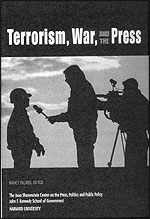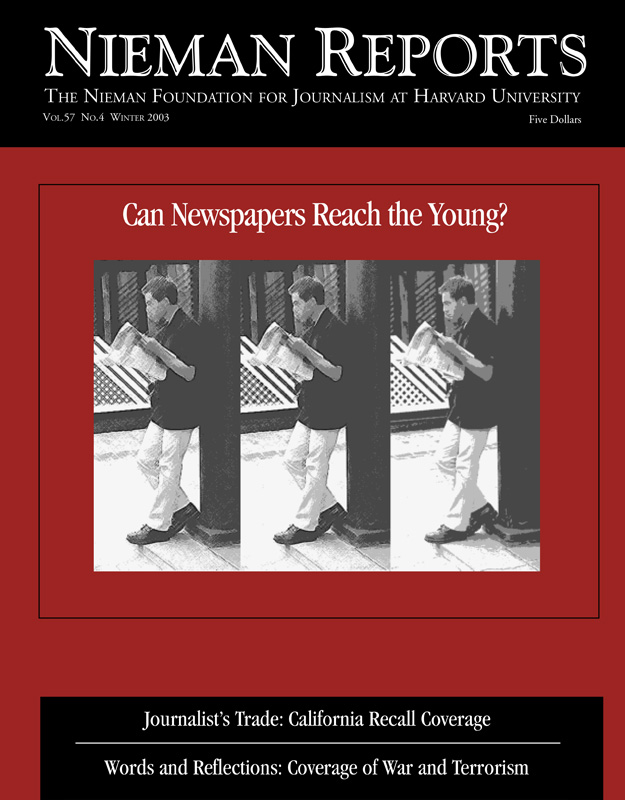 Terrorism, War, and the Press
Terrorism, War, and the Press
Edited by Nancy Palmer
Hollis Publishing Company. 316 Pages. $19.95 Paperback.
In “Terrorism, War, and the Press,” the Joan Shorenstein Center on the Press, Politics and Public Policy has assembled papers written by visiting fellows, including those from the U.K., Northern Ireland, India, Israel and the United States. Each has lived through, reported on or studied these issues. In his contribution to this collection, first published in January 2003, entitled “U.S. Government Secrecy and the Current Crackdown on Leaks,” Jack Nelson, former Washington bureau chief for the Los Angeles Times and a 1962 Nieman Fellow, explores the practice of government leaks, their uses by journalists, and the impact they can have. Excerpts from his paper follow. The paper can be found at www.shorensteincenter.org.
“In the never-ending sparring match between the government and the news media, no subject produces more friction than the practice of leaking classified information. Government officials—at least those who don’t leak—denounce the practice. They say it can damage intelligence operations and reduce the government’s ability to detect and deter terrorists or other enemies.
“Journalists, on the other hand, say they couldn’t do their jobs without the leaks. Almost all leaks come from government officials, they point out. And in an era of managed news and wholesale classification of government documents, such back-channel information is often the only way the public can gain an understanding of what its government is thinking and doing.
“Not surprisingly, the debate over leaks has become increasingly heated since the September 11th terrorist attacks and the showdown with Iraq over giving up any chemical and biological weapons and abandoning its quest to develop weapons of mass destruction. Defense Secretary Donald Rumsfeld called for jail terms for leakers and President Bush joined him in denouncing them. An intelligence official even suggested sending ‘swat teams into journalists’ homes’ if necessary to root out reporters’ sources. …
Editor’s note:
A group of Washington journalists and senior intelligence officials have met since the fall of 2001 for an “informal, ongoing dialogue about the issue of protecting government secrets without infringing on the right to report on the government,” with investigative journalist Scott Armstrong and Jeffrey Smith, former general counsel of the Central Intelligence Agency, as facilitators.“Several participants said one of the most significant achievements of the Dialogue meetings, aside from weighing in on Ashcroft’s decision not to seek anti-leaks legislation, has been a recognition on both sides of the need for the media and the government to be educated about both the dangers and the values of leaks. ‘National security leaders need to understand that some leaks are good for democracy and the country even though others are bad,’ says Jeffrey Smith. ‘The press needs to understand more about the sensitivity of national security leaks. Everybody understands you don’t publish that the 82nd Airborne is planning to land somewhere, but not everyone understands that it’s a national security problem to report that Osama bin Laden’s cell phone calls have been intercepted.’ …
“The war on terrorism and the showdown with Iraq clearly have given a greater sense of urgency to the issue of unauthorized disclosure of sensitive national security secrets. Journalists such as those attending the Dialogue sessions say they clearly are more concerned now about the dangers of such disclosures. …
“In today’s climate, leaks undoubtedly will become an even more burning issue. With the war on terrorism raising serious concerns about violations of press freedom and other civil liberties, the news media and the government should continue the Dialogue sessions to broaden understanding on both sides. Dialogue meetings make it easier for both sides to avoid knee-jerk reactions. Also, the more sophisticated the news media’s understanding of the problems, especially when dealing with sensitive intelligence, the greater the media’s ability to avoid needless damage.”



